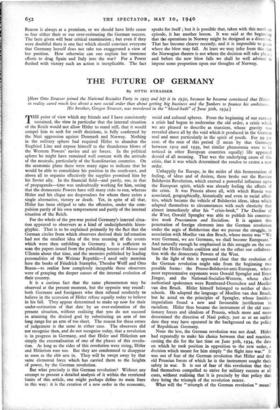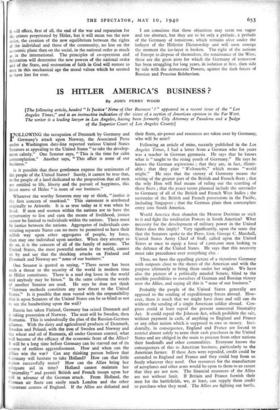THE FUTURE OF GERMANY
By OTTO STRASSER
[Herr Otto Strasser joined the National Socialist Party in 1925 and left it in 1930, because he became convinced that Hitler in reality cared much less about a new social order than about getting big business and the Yunkers to finance his ambitions. His brother, Gregor Strasser, was murdered in the "blood-bath" of 7une 30th, 1934.] THE point of view which my friends and I have consistently • sustained, the view in particular that the internal situation of the Reich would not allow Hitler to stand still, that it would compel him to seek for swift decisions, is fully confirmed by the Nazi aggression against Denmark and Norway. Nothing in the military sphere had required Hitler to abandon the Siegfried Line and expose himself to the thunderous blows of the Western Powers' navies and air forces. In the political sphere he might have remained well content with the attitude of the neutrals, particularly of the Scandinavian countries. On the economic plane there were many signs to indicate that he would be able to consolidate his position in the south-east, and above all to organise effectively the supplies promised him by his Soviet ally. In the financial field—and partly, too, in that of propaganda—time was undoubtedly working for him, seeing that the democratic Powers have still many risks to run, whereas Hitler and his clique are desperadoes for whom there exists a single alternative, victory or death. Yet, in spite of all that, Hitler has been obliged to take the offensive, under the com- pulsion partly of his own temperament and partly of the internal situation of the Reich.
For the whole of the pre-war period Germany's internal situa- tion appeared to observers as a kind of undecipherable hiero- glyphic. That is to be explained primarily by the Pact that the German circles from which observers derived their information had not the smallest idea of the true meaning of the events which were then unfolding in Germany It is sufficient to scan the papers issued from the publishing houses of Mosse and Ullstein about that time, and the memoirs published by leading personalities of the Weimar Republic—I need only mention here the books of Friedrich Stampfer, Theodor Wolff and Otto Braun—to realise how completely incapable these observers were of grasping the deeper causes of the internal evolution of their country.
It is a curious fact that the same phenomenon may be observed at the present moment, but the opposite way round: both Germans and foreigners who then refused resolutely to believe in the accession of Hitler refuse equally today to believe in his fall. They appear determined to make up now for their under-estimation of that date by an over-estimation of the present situation, without realising that you do not succeed in attaining the desired goal by substituting an arm of too long range for an arm of too short. The reason for these errors of judgement is the same in either case. The observers did not recognise then, and do not recognise today, that a revolution is in progress in Germany, and that Hitler and Hitlerism are simply the externalisation of one of the phases of this revolu- tion. As long as the tides of this revolution were rising, Hitler and Hitlerism rose too. But they are condemned to disappear as soon as the ebb sets in. They will be swept away by that same elemental force which has carried them to the heights of power, by the German revolution.
But what precisely is this German revolution? Without any attempt to present a detailed analysis of it within the restricted limits of this article, one might perhaps define its main lines in this way: it is the creation of a new order in the economic, social and cultural spheres. From the beginning of our century a crisis had begun to undermine the old order, a crisis which we are pleased to describe as transient, whose gravity was revealed above all by the void which it produced in the Gentian soul and most particularly in the spirit of youth. For 99 per cent. of the men of this period (I mean by that Germany between 1919 and 1939, but similar phenomena were to be noticed in other European countries equally) life appeared devoid of all meaning. That was the underlying cause of this crisis, that it was which determined the resolve to create a new order.
Unhappily for Europe, in the midst of this fermentation of feeling, of ideas and of desires, there broke out the Russian Bolshevist Revolution, which exerted a powerful influence upon the European spirit, which was already feeling the effects of the crisis. It was Prussia above all, with which Russia was associated, geographically, historically and even in racial affini- ties, which became the vehicle of Bolshevist ideas, ideas which adapted themselves to circumstances with such elasticity that almost immediately after his "crisis-book," The Decline of the West, Oswald Spengler was able to publish his construc- tive work Prussianism and Socialism. It is against this penetration of foreign elements into the German revolution under the aegis of Bolshevism that we pursue the struggle, in association with Moeller van den Bruck, whose motto was "We were Germani, we are Germans, we shall become Europeans." And naturally enough he emphasised in this struggle on the one hand the Hitler-Stalin coalition and on the other our collabora- tion with the democratic Powers of the West.
In the light of this it appeared clear that the evolution of the German revolution might take from the beginning two possible forms: the Prusso-Bolshevist-anti-European, whose most representative exponents were Oswald Spengler and Ernst Jiinger, and the National-Socialist-Western, whose chief authorised spokesmen were Rembrand-Deutschen and Moeller van den Bruck. Hider himself belonged to neither of these schools. He adopted the language of Moellen van den Bruck, but he acted on the principles of Spengler, whose limitless imperialism found a new and favourable justification in racialism. Hitler thus became the instrument of the old reac- tionary forces and idealism of Prussia, which more and more determined the direction of Nazi policy, just as at an earlier date they may have operated in the background on the policy of Republican Germany.
None the less, the German revolution was not dead. Hitler had repeatedly to make his choice between that and reaction, casting the die for the last time on June 30th, 1934, the date on which he took position in opposition to the new order, a decision which meant for him simply "the flight into war." It was out of fear of the German revolution that Hitler and the old Prussian forces of which he is the instrument sought their safety in war. It is out of fear of this revolution that they find themselves compelled to strive for military success at all costs, without realising that it is precisely by that policy that they bring the triumph of the revolution nearer.
What will the "triumph of the German revolution" mean? it will effect, first of all, the end of the war and reparation for thc crimes perpetrated by Hitler, but it will mean too the new order, the creation of the new equilibrium between the rights of the individual and those of the community, no less on the economic plane than on the social, in the national order as much as in the international. The principles of co-operation and federation will determine the new powers of the national order and of the State, and restoration of faith in God will restore to man in this mechanical age the moral values which he seemed to have lost for ever. I am conscious that these objectives may seem too vague and too abstract, but they are to be only a prelude, a prelude of the Germany of tomorrow, which remains alive under the icelayer of the Hitlerite Dictatorship and will soon emerge the moment the ice-layer is broken. The right of the nations of Europe to dispose of themselves, the renaissance of the West, these are the great aims for which the Germany of tomorrow has been struggling for long years, in isolation at first, then side by side with the democratic Powers, against the dark forces of Russian and Prussian Bolshevism.































 Previous page
Previous page